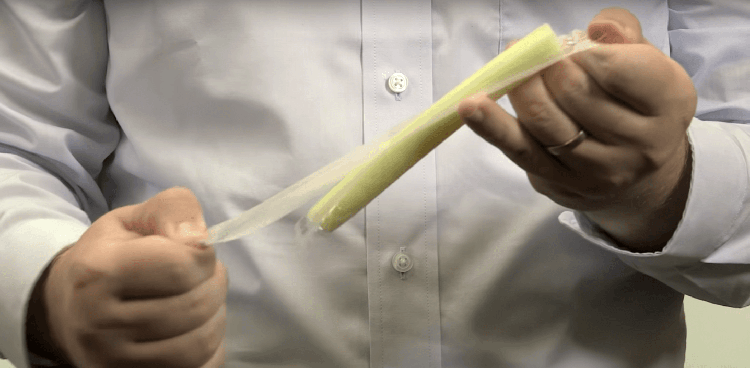
Plastic is a huge problem for the environment—I know that when I cook, a lot of my cleanup involves snatching up all the small pieces of (mostly plastic) packaging that litter my counters. (And EcoWatch reports that enough plastic is thrown away each year to circle the earth four times!) Particularly with perishables like cheese, plastic wrap feels like a necessary evil to avoid ending up with rotten, moldy food (though your best bet with cheese is usually waxed paper). However, a solution might be closer to home than we could ever have guessed.
A team of scientists at the USDA, lead by Dr. Peggy Tomasula and Dr. Laetitia Bonnaillie, is currently developing an edible plastic wrap that actually protects food better than what we’re all currently using. The plastic wrap utilizes casein, a protein found in milk, to create the plastic. Casein is the protein integral to coagulation during the cheesemaking process, helping the milk turn from a liquid into solid, delicious curds. The plastic is made from a mixture of casein and citrus pectin (used in jams to gel the preserves), which makes the plastic stronger and easier to wrap around food. (Citrus and dairy usually make a good match.)
There are already a few kinds of edible plastic wraps on the market, but EurekAlert! reports that those varieties are all very porous, meaning your wheel of brie is barely protected from oxygen or those Chinese leftovers you’ve been keeping in the fridge. The plastic wrap made from casein, however, is up to 500 times better at blocking oxygen than even regular plastics on the market right now.
The casein wrap can even be used both in food production and to wrap single-serve items like string cheese sticks. “I use these a lot, and my thought every time is there’s almost more plastic than cheese,” Bonnaillie told Bloomberg. If the packaging was edible, too, your string cheese could be a little more guilt-free. Some companies could even use casein sprays to add some extra crunch to cereal or line pizza boxes to protect from grease stains.
Tomasula estimates that the product is about three years away from mass production. Some are projecting that this could revolutionize how soups are packaged—rather than having a disposable can, an edible bag that dissolves in boiling water could become a food-safe alternative—but really there are endless possibilities on the horizon. Imagine peeling away layers of plastic before your string cheese and eating those, too, or cutting into a flavored edible wrap along with your favorite cheese as you prepare a meal. Whatever unfolds in the next few years, I’m excited (though a little nervous) to eat it!
Feature Photo Credit: AMerican Chemical Society



